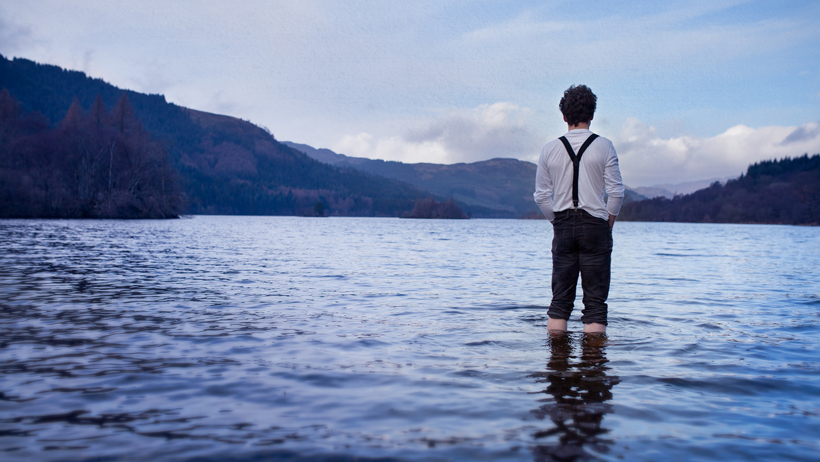I recently began networking and going out in an effort to better myself, as well as expand my network and interpersonal skills. Due to my introverted and shy nature, this is a big step for me. Yet, much like my decision to become a practicing Jew, go on Birthright, study abroad in Poland, and join the Alpha Epsilon Pi fraternity, I took a deep breath and jumped in while placing my faith in Him that it was all for the best and He would be with me for whatever came next.
Looking back on my past experiences, I am reminded of the story of the Nachshon journeying into the Sea of Reeds. It remind me of how I followed Nachshon's example by jumping into my owns "seas" with a similar conviction of faith.
Many times, that can be scary. In those times, when we desire to flinch and return to the status quo, it helps to remember the example of Nachshon. In thinking back on my toughest decisions, this story reminds me how life presents us with our own shores to cross and how we all have to take tremendous leaps into those seas if we want to better ourselves.
In the story, when the Children of Israel reached the Sea of Reeds, they hesitated at first to plunge into uncharted waters. As the Israelites deliberated on this matter, Nachshon ben Aminadav -- the prince of the Tribe of Judah -- stepped forward and walked into the sea. As the water crept up, he continued onward trusting that G-d was with him. When the water reached his nostrils and it seemed he would drown, that was the moment that the sea split.
In looking at works such as the Talmud and Midrash, more of the story is brought to light and reveals greater what the story of Nachshon can bring to our lives.
The Talmud relates:
Rabbi Judah answered Rabbi Meir that in reality, no tribe was willing to be the first to go into the sea. Then Nachshon ben Aminadav stepped forward and went into the sea first, praying in the words of Psalm 69:2-16, "Save me O God, for the waters come into my soul. I sink in deep mire, where there is no standing . . . . Let not the water overwhelm me, neither let the deep swallow me up." Moses was then praying, so G-d prompted Moses, in words parallel those of Exodus 14:15, "My beloved ones are drowning in the sea, and you prolong prayer before Me!" Moses asked G-d, "Lord of the Universe, what is there in my power to do?" G-d replied in the words of Exodus 14:15-16, "Speak to the children of Israel, that they go forward. And lift up your rod, and stretch out your hand over the sea, and divide it; and the children of Israel shall go into the midst of the sea on dry ground." Because of Nachshon's actions, Judah merited becoming the ruling power in Israel, as Psalm 114:2 says, "Judah became His sanctuary, Israel His dominion," and that happened because, as Psalm 114:3 says, "The sea saw [him], and fled" (Sotah 36b-37a).
The Midrash relates similarly and expands on the story:
Rabbi Yehudah bar Ilai said: "When Israel was at the sea, the tribes were arguing with each other. One tribe said: 'I will go down first [into the sea]', and the other tribe said 'I will go down first.' Nachshon jumped first into the waves of the sea and went down, and on him David said, 'Deliver me, O G-d, for the waters have reached my neck.' Said the Holy One of Blessing to Moshe: My beloved is sinking in the sea and you are praying?! 'Tell the Israelites to get going!' (Ex. 14:15) 'This is 'E-lohim is known in Yehudah.' and therefore the Holy One of Blessing increased the name of Nachshon among Israel, that he merited to be the first to bring offerings [for the Mishkan] , as it says: 'And the bringer on the first day, etc' - this is 'and in Israel his name became great.' (Bemidbar Rabbah 13:5)
These two accounts talk about doing something versus putting those actions into practice. Anyone can talk about doing something, but it takes determination and faith to take the first deep breath and leap into the unknown as Nachshon did.
The second major theme that arises from the Sages' account of Nachshon is how through taking that jump, Nachshon sanctified G-d. As it is summarized on in Tosefta Berachot:
"When [all of] the tribes came and stood by the sea, this one said, 'I will go down [into the water first]' and this one said, 'I will go down [into the water first].' The tribe of Yehudah jumped up and went in first and sanctified G-d's name [by doing so]" (Tosefta Berachot 4:16).
It harkens back to that the old saying of how actions speak louder than words. Nachshon acted and plunged into the sea knowing G-d was with them, thus sanctifying G-d's name. This pressured Moses, his prophet, to split the sea, which saved him from drowning and ushered along the Exodus.
Finally, through his sanctification of the Divine name both for his taking the plunge into the sea and through his prayer when the waters advanced on him, Nachshon became worthy of ruling over Israel and siring the Davidic dynasty, i.e. he was blessed to inherit the kingship for his sanctification.
In our lives, this lesson translates into how our actions and prayers bring blessings upon ourselves and households through the observance of mitzvot.
An in-depth look at the story of Nachshon illustrates a multilayered message for us to follow. While the mainstream version is worth learning and taking to heart, learning is a continuous process; something with one layer can reveal itself to have multiple layers containing even greater knowledge.
In its simplest form, the story highlights the importance of faith and how G-d never abandons those who cling to Him, but the Talmud and Midrash bring to light how having the conviction to act on wholehearted faith brings forth blessing and salvation because we sanctify Him through our action.
The trials of my life have been, for me, tremendous, especially in my post-graduate career, but I have gained tremendously from following Nachshon's example. Whether boarding a plane to Europe or tying my tie for a job interview, I always have faith knowing that G-d is with me and he will see me through the sea. I know, and G-d knows, that I -- and all of us -- will emerge on the opposite shore, heading toward the future.








.jpg)



